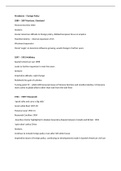Presidents – Foreign Policy
1889 – 1897 Harrison, Cleveland
Monroe Doctrine 1823
Analysis:
Insular American attitude to foreign policy, disliked European focus on empires
Manifest destiny – internal expansion of US
Westward expansion
Moral ‘angle’ on American influence growing, would change in further years
1897 – 1901 McKinley
Spanish-American war 1898
Leads to further expansion in next few years
Analysis:
Imperialist attitude, rapid change
Relatively fats gain of colonies
Turning point FP – whilst still honoured views of Monroe Doctrine and manifest destiny, US became
more active in global affairs rather than look from the side-lines
1901 – 1909 T Roosevelt
‘speak softy and carry a big stick’
Great white fleet 1907-09
Panama Canal 1903-14
Roosevelt Corollary 1904
Assertive charter highlighted in Alaskan boundary dispute between Canada and Britain 1903
‘open door’ policy China
Analysis:
Continue to include foreign policy even after left white house
Imperialist nature of foreign policy, continuing on developments made in Spanish-American civil war
, 1909 – 1913 Taft
‘dollar diplomacy’ focus on financial control of South America, Caribbean
Analysis:
Small TP – can be seen as beginning economic imperialism
Despite dollar diplomacy being revoked under Wilson, principle of economic influence in Latin
America continued – grew throughout the period
1913 – 1921 Wilson
Focused on reversing the aggressive expansionist policy of previous presidents
WW1, neutrality
Diplomacy WW1, neutrality and peace
December 1916, peace note
1917, peace without victory
Shift in US foreign policy, American ideals of neutrality on global scale
Furthered in publication of Wilsons 14 points, influencing Versailles peace treaty
Analysis:
Not fully neutral, supplied raw materials/mutation, boosting US economy, increasing economic
growth
Neutrality acts 1921 – TP from expansionist, American imperialist to neutral isolationist of 1920-30s
Shift in trend of foreign policy, decreased pace and rate of change of expansion
Increased pace and rate of change in economy and military
1921 – 1933 Harding, Coolidge, Hoover
1921 Washington Naval conference, isolationist in trying to limit international interferences, also
interventionist in trying to dictate policies of other nations
Analysis:
Shows isolationist attitudes, division over WW1
Period of division in foreign policy – isolationist and interventionism both evident





